Trying to convince people to click on a long, jumbled link is almost as bad as a door-to-door salesman trying to sell people financial services.
If your audience sees a link they perceive to be spammy in one of your social media posts, they’ll do the digital equivalent of slamming the door in your face — scroll past it.
To avoid being perceived as spammy or sloppy when you have a legitimate link to share, check out our list of the best link shorteners that’ll turn your links into clean, consistent, and clickable URLs.
What are the benefits of using link shorteners?
Shortening your links makes them easier to share and track their performance. They’re an excellent choice for business owners, marketers, individuals, and anyone who’d like to post links that are easy to read and remember.
URL shorteners benefit your brand in several ways:
Shortened links are more user-friendly.
When you post long links on social media, it can look like spam or deter users from clicking on something they don’t recognize. In particular, adding tracking parameters (such as UTM codes) to your links can result in URLs that look long and confusing. Link shorteners can turn spammy-looking links into clear and user-friendly links.
You can track your links’ analytics.
Many link shorteners let you track your links’ performance and analytics, which can help you understand which pieces of content perform best on specific platforms. Typically, you’ll be able to see the number of people who clicked on the link in a preset amount of time and where most of the clicks are coming from.
You can include shortened URLs in your social posts.
Every social media network limits the number of characters you can include in your posts. Twitter and LinkedIn have the shortest character limits at 280 and 700 characters, respectively, so if you need to squeeze a link or an extra hashtag in one of your posts, link shorteners can help you stay within the limit.
Shortened links don’t need anchor text.
Anchor text refers to the word or phrase that’s hyperlinked. Marketers use anchor text to optimize their link and ensure it indicates the content that the link leads to. If you’re adding an URL in a place where you can’t add anchor text (such as in a social post or social media bio), you can opt to shorten the link and include the keyword in the slug.
Shortened URLs count as backlinks and improve your SEO.
Because shortened URLs are essentially 301 redirects, they count as backlinks, because they’re still pointing to your website. Using a link shortening service improves your SEO because it gives you the ability to link to your blog posts and pages in more places.
Convinced? Let’s take a look at the top link shorteners you can use.
1. Bitly
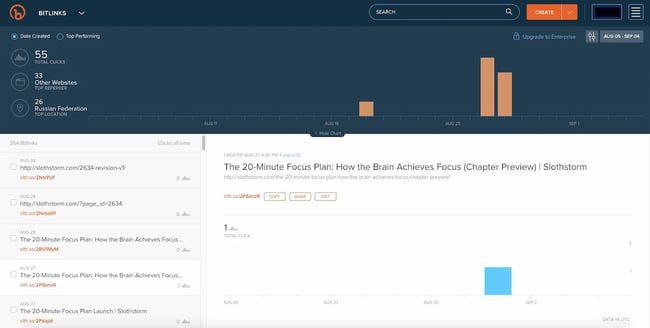 Image Source
Image Source
Bitly (sometimes referred to as Bit.ly) is a link shortener platform that features a comprehensive dashboard that displays your links’ performance metrics, such as click-through rates and channel stats. It also shows you the geographic information of the people clicking on your links.
The tool also offers branded links and has integrations with social media management software (such as HubSpot) to help you seamlessly distribute your shortened links through your social media profiles.
Bitly’s free account offers up to 1,000 unbranded links and link reporting for 30 days, which is ideal for small businesses. Its enterprise plan lets you brand 10,000+ links a month and provides all the data and metrics mentioned above. This subscription tier is best for large businesses that want to brand and track every link in their marketing campaigns.
Best For
Individuals and small to enterprise businesses. It offers the advantage of being free while also allowing you to add custom slugs, making it ideal for both general and business use.
Pros
- Ability to shorten links without signing up
- 1,000 shortened links included in free version
- Ability to add 50 custom slugs per month in a free subscription
- Good choice for getting started with link shorteners
Cons
- You can only customize the slug once you sign up
Pricing: Free; $29/month (Basic); $199/month (Premium); Custom (Enterprise)
2. Bl.INK
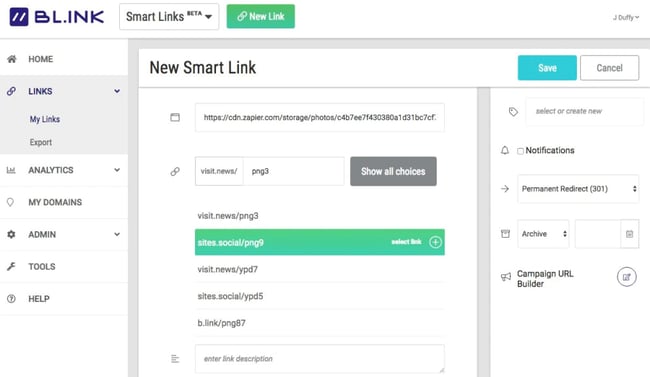 Image Source
Image Source
As one of the more robust link shorteners out there, Bl.INK offers smart branded links that contain relevant words and not just a random string of characters.
It also provides analytic reports that can track clicks by date, time, language, referrers, device, and location. The tool integrates with web analytic tools like Google Analytics and Adobe.
Bl.INK offers five subscription tiers. Starting at $48 per month, it prices its plans based on the number of links you’d like to create and track.
Best For
Enterprise businesses with an established link shortening strategy. That way, you can use its wealth of features right away.
Pros
- Extensive list of features that are ideal for avid link shortening users
- Cheapest subscription offers 10,000 links — triple of what Bitly offers in their lowest subscription
- Ability to bulk edit links
Cons
- No option to shorten links without signing up
- It only tracks a limited number of clicks (starting at 7,500)
Pricing: $48/month (Expert+); $99/month (SMB); $299/month (Team); $599/month (Business); Custom (Enterprise)
3. Rebrandly
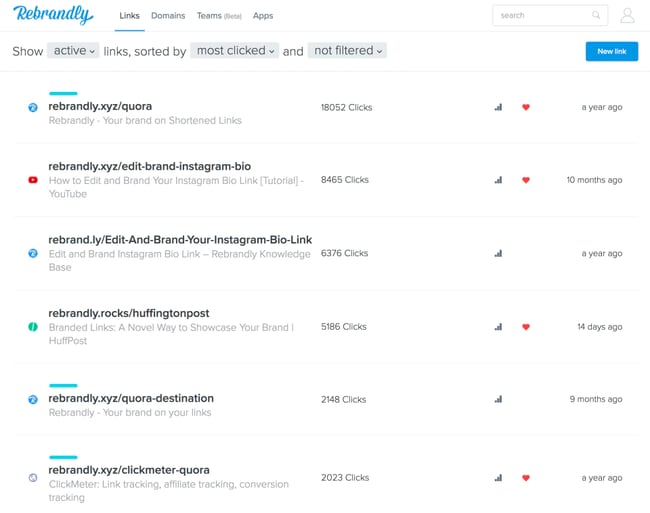 Image Source
Image Source
Trusted by over 250,000 customers, Rebrandly is a link shortener platform that can brand your links, track their performance metrics, or integrate with over 50 other platforms to seamlessly distribute your links.
With three plans for individuals and two plans for teams, Rebrandly offers link shortening solutions for small businesses that have a high potential for growth. For instance, its free plan offers 5,000 tracked clicks, 500 branded links, and 5 custom domain names, while its premium plan offers 150,000 branded links, 20 custom domain names, and 1,500,000 tracked clicks for $499 per month.
Note, however, that some services, such as Bitly, offer unlimited tracked clicks. If you expect to receive a large number of clicks, consider using those services instead.
Best For
Small businesses that want to start building a link shortening strategy. Rebrandly’s starting price is low, but its features rival and even exceed those of its top competitors.
Pros
- Ability to shorten links without signing up
- Includes a UTM builder in the free version — Bitly and BLINK do not
- Includes custom URL slugs in the free version
Cons
- No unlimited tracked clicks available
Pricing: Free; $29/year (Starter); $69/year (Pro); $499/year (Premium); Custom (Enterprise)
4. Ow.ly
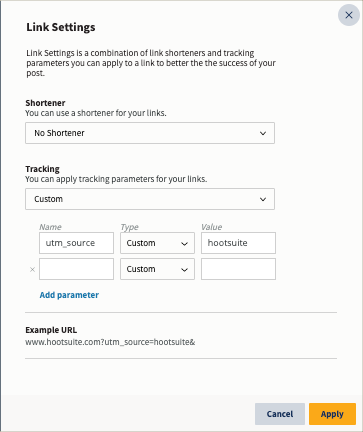 Image Source
Image Source
Developed by the social media management platform Hootsuite, Ow.ly is a link shortener that’s included in every free Hootsuite account. With Ow.ly, you can distribute your links and track their performance metrics directly in the Hootsuite platform, which allows you to shorten every single link you post to all your social media profiles. Ow.ly is a great option for anyone who already uses Hootsuite as their social media management platform.
The one limitation of this tool is that there’s no information on the features that Ow.ly offers, including the number of tracked clicks. A UTM builder is available within the platform.
Best For
Current Hootsuite users or those who are interested in managing their social media presence using Hootsuite. The best part is that it’s free, making it a good choice if you’re just getting started with Hootsuite.
Pros
- Integrated right in the Hootsuite platform
- Ability to see link analytics alongside other social analytics
- UTM builder available within the settings
- A natural choice for those who are using Hootsuite
Cons
- No option to shorten links without signing up
- Not a great choice for those who aren’t using Hootsuite; other options offer more robust features
Pricing: Free
5. Linktree
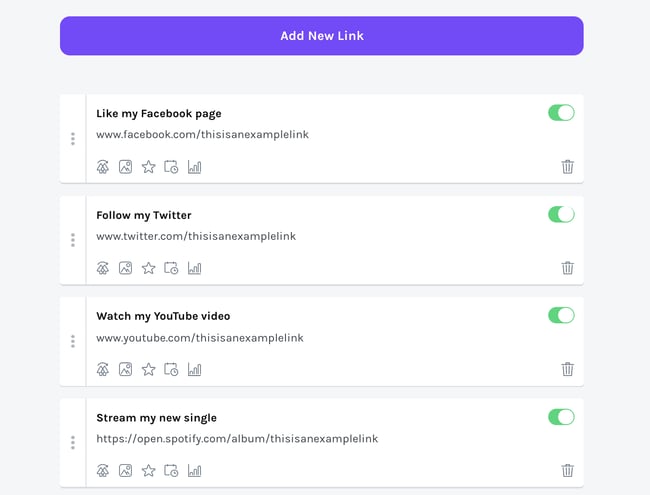 Image Source
Image Source
Linktree isn’t strictly a URL shortening service. Rather, it’s a service where you add a list of links to a profile (like this one). Instead of listing all of the links you want to promote on every social post or profile, you add them to your Linktree. You then add the Linktree URL to your social bios.
This tool is ideal for platforms such as Instagram, where you can add only one link to your profile. The best part is that Linktree offers a short and user-friendly URL structure (e.g. linktr.ee/yourname) so that it looks and feels like a shortened link. You won’t have to clutter your Instagram profile with a long and spammy-looking URL.
It also offers analytics that allow you to see which links get clicked on the most and how much traffic your Linktree profile is getting.
Best For
Avid Instagram users who want to keep all of their links in one place. It offers analytics as well, so you could potentially use it for business and marketing purposes.
Pros
- Allows you to keep unlimited links in one place
- Short and user-friendly profile link is easy to remember
- Best choice for Instagram users
Cons
- Not a good fit if you’re trying to shorten individual links
- Free version doesn’t allow you to see detailed analytics
- Wouldn’t count as a backlink, while a traditional shortened link would
Pricing: Free; $6/month (Pro); Custom (Enterprise)
6. TinyURL
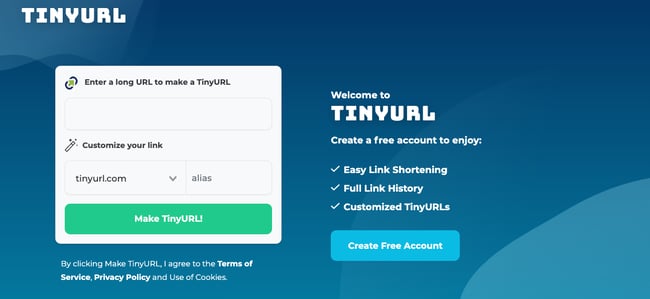 TinyURL is a free link shortening platform that’s perfect for users who want to shorten links every once in a while.
TinyURL is a free link shortening platform that’s perfect for users who want to shorten links every once in a while.
Using TinyURL is simple. All you have to do is go to TinyURL.com and follow the instructions. You can quickly fill in the link you want a short URL for and add a custom alias. If no one uses your alias, the link you will get will look something like “tinyurl.com/alias.” Once you fill in the URL information and press submit, you can rename, edit, and share the URL.
Don’t be tricked by the tool’s simplicity: It also allows you to track key metrics and analytics for your links after you sign up for a free account. Even if you only use it for a one-time project, you can track the success of the campaign with ease. The one limitation is that it only allows you to keep one active TinyURL at a time unless you upgrade to a paid subscription.
Best For
Hobbyists who want to shorten links only once in a while. Because of its emphasis on its plug-in-and-go link shortener, it’s a much better fit for you if you’re planning to trim one link at a time and use it for a short while.
Pros
- One of the easiest link shorteners in this list, with an emphasis in its plug-in-and-go tool
- Includes analytics in case you want to track clicks and performance
- Allows you to establish a custom slug right away — Bitly only lets you when you sign up
Cons
- Only allows you to keep one active TinyURL at a time on the free version
Pricing: Free; $9.99/month (Pro); $99/month (Bulk 100K)
7. Tiny.CC
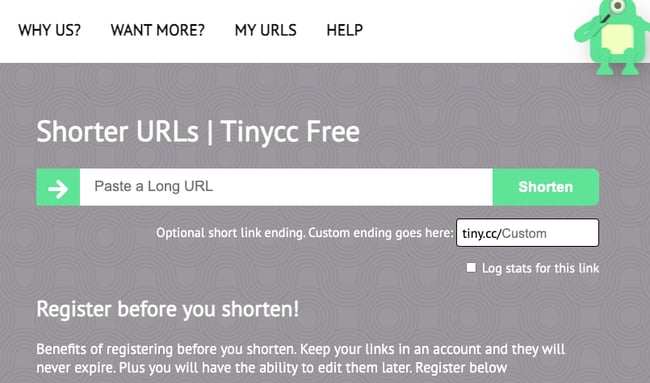 Tiny.CC is another free link shortener that allows you to create temporary short links by simply pasting your long link into a text box and pressing Shorten. Like TinyURL, you can also customize the slug.
Tiny.CC is another free link shortener that allows you to create temporary short links by simply pasting your long link into a text box and pressing Shorten. Like TinyURL, you can also customize the slug.
If you register or become a paid subscriber, you can have non-expiring links and edit URLs later. If you’re a free user, the link will eventually expire and you cannot edit them once they’re generated. While it’s the most limited tool in this list, it’s also the easiest to use.
It has the added benefit of having a short domain name. Consider the difference between “TinyURL.com/example” and “Tiny.CC/example.” While the character count might not be so different, the shortened URL from Tiny.CC looks a lot more concise and trim.
Best For
Quick and easy one-time link shortening. If you’re interested in more robust features, you can upgrade to one of Tiny.CC’s premium plans.
Pros
- The easiest link shortener in this list — simply plug in and go
- Ability to customize the slug without needing to sign in
- Paid options start at a cheaper price point ($5 versus Rebrandly’s $29, as an example)
- Easy option for quick link shortening
Cons
- The free tool is much more limited in scope and features than other options
Pricing: Free; $5/month (Basic); $25/month (Business); $44/month (Pro); Custom (Enterprise)
After you master shortening your URLs, you might also want to look into a similar process of creating QR codes, which acts like a shortcut to your website — but from print materials instead.
Navigating Link Shorteners
If you have to share a few ginormous links, there’s no harm in shortening them because the process is quick and simple. Aside from being easier to look at, shortened links can also be helpful for print ads, physical signage, or places where you can’t link to another site.
There is a handful of free or affordable link shortening websites out there. But you might be wondering which to choose. To help you, we’ll leave you with a few quick tips.
- If you don’t use website analytics software, you might want to use a link-shortener that includes basic stats like page views and clicks to measure your traffic.
- If you want to customize your link, choose a shortener that allows you to edit the URL slugs. All of the options on the list allow you to do that, but some, like Bitly, require you to sign up for an account first.
- Branded shortened links look and perform better than unbranded shortened links. Rebrandly and Bitly are two of the best options to brand your shortened links.
- Use Tiny.CC and TinyURL for quick link shortening. They don’t require you to sign up and allow you to edit the slug in one simple step.
- You won’t be able to transfer a link from one link shortener to another, so choose one wisely.
- If you’re looking for the cheapest premium option, Tiny.CC starts at $5 monthly and offers comparable features to more expensive options.
Use an URL Shortener to Drive More Referral Traffic
Link shorteners allow you to place a link on places with limited character count and space. By using a URL shortener, you can ensure your site is visible on all of the platforms you’re on, boosting referral traffic and increasing leads from your marketing efforts.
Editor’s note: This post was originally published in January 2019 and has been updated for comprehensiveness.

![]()


